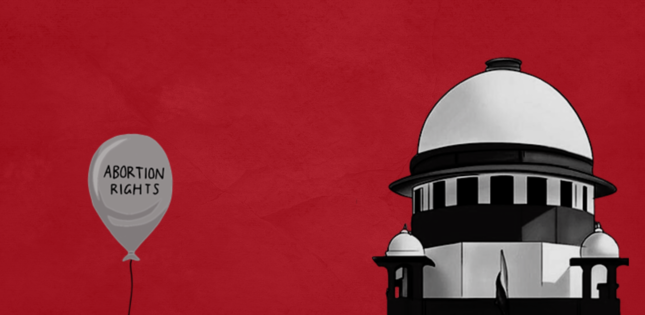Expansion of Abortion Rights by Supreme Court (GS Paper 2, Judiciary)

Why in news?
- Recently, the Supreme Court ruled that single and unmarried women with pregnancies between 20 and 24 weeks are entitled to access the same safe and legal abortion care as married women.
Judgement:
- Interpreting the Rules framed under the Medical Termination of Pregnancy (MTP) Act, 1971, a Bench led by Justice D.Y. Chandrachud said “the rights of reproductive autonomy, dignity and privacy give an unmarried woman the right of choice as to whether or not to bear a child on a similar footing as that of a married woman.”
- In another judicial recognition of marital rape, which is not recognised as an offence under the Indian Penal Code, the Court also said sexual assault by a man on his wife can take the form of rape.
Do women in India now have equal abortion rights?
- Under the current legal framework, the MTP Act lays out exceptions to the provisions criminalising abortion in Sections 312-318 of the Indian Penal Code.
- The Court was hearing a case of a 25-year-old unmarried woman, whose plea to terminate a pregnancy before the completion of 24 weeks was rejected by the Delhi High Court pointing out that the Medical Termination of Pregnancy Rules, 2003, did not extend to unmarried women in a relationship.
- Taking a “purposive” view of a “beneficial legislation” like the MTP Act, the Court declared that unmarried women be included within the ambit of Rule 3B of the MTP Rules. The MTP (Amendment) Act, 2021, had introduced a key change in Section 3 by extending the upper limit for termination of pregnancy from 20 to 24 weeks.
- Specifically, Explanation II replaced this point; anguish caused by a pregnancy resulting from a failure of any device or method used by any “married woman or her husband” in the unamended Act, to “any woman or her partner”, thus bringing pregnancies which happen outside the institution of marriage within the “protective umbrella of the law”.
What did the Supreme Court lean on to make its decision?
- The Bench said “constitutional values, such as the right to reproductive autonomy, the right to live a dignified life, the right to equality, and the right to privacy” led it to reinterpret the contours of the MTP Act and the MTP Rules.
- In the context of abortion, the right to dignity entails recognising the competence and authority of every woman to take reproductive decisions, including the decision to terminate the pregnancy.
What is the situation on the ground?
- Women’s rights activists say a lot more needs to be done so that all women feel safe to take a decision on their bodies. India’s abortion laws are moving in a progressive manner, they say, especially in the light of what has happened in countries like the U.S. where the constitutional right to abortion was overturned by the Supreme Court in June.
- In India, besides patriarchal mindsets and social stigma, unmarried and single women face greater hurdles in exercising a right over their bodies, thus leading to higher risks and complications. Many women are forced to go to quacks when there are unwanted pregnancies.
- As the Court noted, unsafe abortions are a leading cause of maternal mortality. The National Family Health Survey 5 (2019) pegs spousal violence (physical and sexual) faced by women in the age group 18-49 years at 29.3%.
What has the court remarked on marital rape?
- The Court said that the meaning of the words “sexual assault” or “rape” in Rule 3B(a) includes a husband’s act of sexual assault or rape committed on his wife.
- The meaning of rape must therefore be understood as including marital rape, solely for the purposes of the MTP Act and any rules and regulations framed thereunder. Any other interpretation would have the effect of compelling a woman to give birth to and raise a child with a partner who inflicts mental and physical harm upon her.
- Human rights experts point out that if a person is guaranteed equality, autonomy and dignity under Articles 14 and 21, then marital rape must be termed a criminal offence.
- Though left out of the Criminal Law (Amendment) Act of 2013, the Justice Verma Committee had recommended that the law should specify that a marital relationship cannot be a defence against sexual violation.


